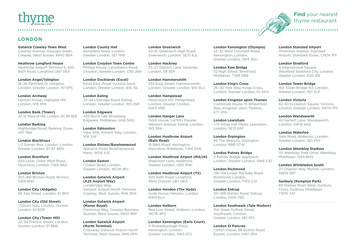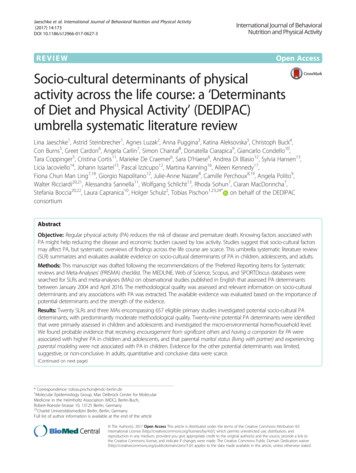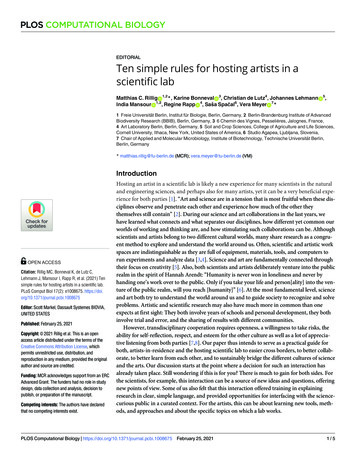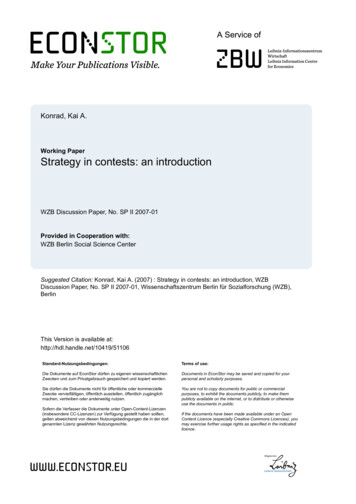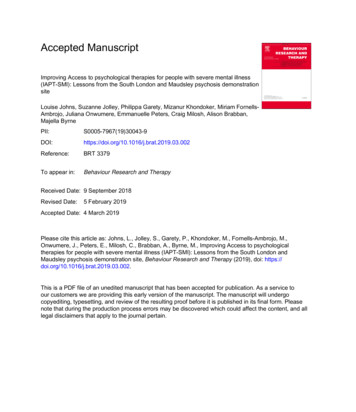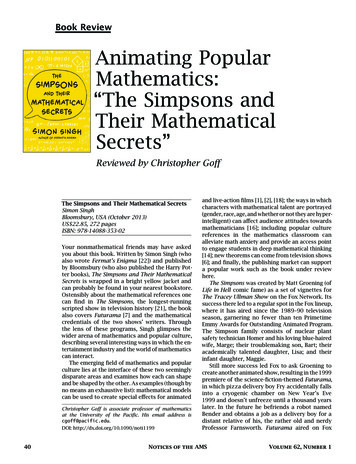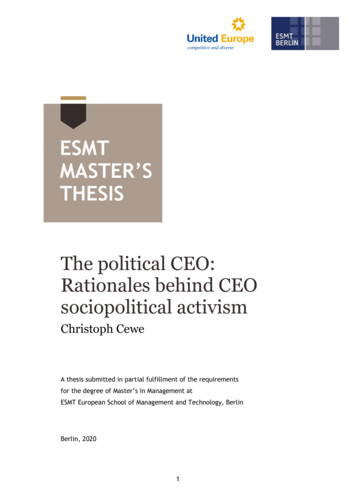
Transcription
.Bloomsbury Publishing, London, Berlin and New YorkFirst published in Great Britain in 2005 by Bloomsbury Publishing Plc36 Soho Square, London, W1D 3QYThis electronic edition published in May 2010 by Bloomsbury Publishing Plc Copyright Shannon Hale 2004The moral right of the author has been assertedAll rights reservedYou may not copy, distribute, transmit, reproduce or otherwisemake available this publication (or any part of it) in any form, or by any means (including without limitation electronic, digital, optical,mechanical, photocopying, printing, recording or otherwise), without the prior written permission of the publisher. Any person whodoes any unauthorised act in relation to this publication may be liable to criminal prosecution and civil claims for damagesA CIP catalogue record for this book is available from the British Library ISBN 978 1 4088 1197 9www.bloomsbury.comVisit www.bloomsbury.com to find out more about our authors and their books You will find extracts, author interviews, author eventsand you can sign up for newsletters to be the first to hear about our latest releases and special offers
.Also by Shannon Hale.THE BOOKS OF BAYERN.The Goose GirlEnna BurningRiver Secrets.Princess Academy.The Book of a Thousand Days
.For Dean.Best Friend, Companion, & Squeeter KeeperYou are Home
nChapter OneThe east says it’s dawnMy mouth speaks a yawnMy bed clings to me and begs me to stayI hear a work songSay winter is longI peel myself up and then make awaynMiri woke to the sleepy bleating of a goat. The world was as dark as eyes closed,but perhaps the goats could smell dawn seeping through the cracks in thehouse’s stone walls. Though still half-asleep, she was aware of the late autumnchill hovering just outside her blanket, and she wanted to curl up tighter andsleep like a bear through frost and night and day.Then she remembered the traders, kicked off her blanket, and sat up. Herfather believed today was the day their wagons would squeeze up the mountainpass and rumble into the village. This time of year, all the villagers felt the rushfor the last trading of the season, to hurry and square off a few more linderblocks and make that much more to trade, that much more to eat during thesnow-locked months. Miri longed to help.Wincing at the rustle of her pea-shuck mattress, Miri stood and steppedcarefully over her pa and older sister, Marda, asleep on their pallets. For a weekshe had harbored an anxious hope to run to the quarry today and be already atwork when her pa arrived. Perhaps then he might not send her away.She pulled her wool leggings and shirt over her sleep clothes, but she had notyet laced her first boot when a crunch of pea-shucks told her that someone elsehad awakened.Pa stirred the hearth embers and added goat dung. The orange lightbrightened, pushing his huge shadow against the wall.“Is it morning?” Marda leaned up on one arm and squinted at the firelight.“Just for me,” said their father.
He looked to where Miri stood, frozen, one foot in a boot, her hands on thelaces.“No,” was all he said.“Pa.” Miri stuffed her other foot in its boot and went to him, laces trailing onthe dirt floor. She kept her voice casual, as though the idea had just occurred toher. “I thought that with the accidents and bad weather lately, you could use myhelp, just until the traders come.”Pa did not say no again, but she could see by the concentrated way he pulledon his boots that he meant it. From outside wafted one of the chanting songs theworkers sang as they walked to the quarry. I hear a work song say winter is long.The sound came closer, and with it an insistence that it was time to join in,hurry, hurry, before the workers passed by, before snow encased the mountaininside winter. The sound made Miri’s heart feel squeezed between two stones. Itwas a unifying song and one that she was not invited to join.Embarrassed to have shown she wanted to go, Miri shrugged and said, “Ohwell.” She grabbed the last onion from a barrel, cut off a slice of brown goatcheese, and handed the food to her father as he opened the door.“Thank you, my flower. If the traders come today, make me proud.” Hekissed the top of her head and was singing with the others before he reachedthem.Her throat burned. She would make him proud.Marda helped Miri do the inside chores—sweeping the hearth and bankingthe coals, laying the fresh goat dung out to dry, adding more water to the saltpork soaking for dinner. As Marda sang, Miri chattered about nothing, nevermentioning their pa’s refusal to let her work. But gloom hung heavy on her likewet clothes, and she wanted to laugh and shake it off.“Last week I was passing by Bena’s house,” said Miri, “and her ancientgrandfather was sitting outside. I was watching him, amazed that he didn’t seembothered by a fly that was buzzing around his face, when, smack. He squashed itright against his mouth.”Marda cringed.“But Marda, he left it there,” said Miri. “This dead fly stuck just under his
nose. And when he saw me, he said, ‘Good evening, miss,’ and the fly . . .”Miri’s stomach cramped from trying to keep speaking through a laugh. “The flywobbled when he moved his mouth . . . and . . . and just then its little crushedwing lifted straight up, as if it were waving hello to me, too!”Marda always said she could not resist Miri’s low, throaty laugh and defiedthe mountain itself not to rumble as well. But Miri liked her sister’s laugh betterthan a belly full of soup. At the sound, her heart felt lighter.They chased the goats out of the house and milked the nannies in the tightchill of morning. It was cold on top of their mountain in anticipation of winter,but the air was loosened by a breeze coming up from a valley. The sky changedfrom pink to yellow to blue with the rising sun, but Miri’s attention kept shiftingto the west and the road from the lowlands.“I’ve decided to trade with Enrik again,” said Miri, “and I’m set on wrestlingsomething extra out of him. Wouldn’t that be a feat?”Marda smiled, humming. Miri recognized the tune as one the quarry workerssang when dragging stones out of the pit. Singing helped them to tug in rhythm.“Maybe extra barley or salt fish,” said Miri.“Or honey,” said Marda.“Even better.” Her mouth watered at the thought of hot sweet cakes, honeyednuts for a holiday, and a bit saved to drizzle on biscuits some bleak winterevening.At her pa’s request, Miri had taken charge of trading for the past three years.This year, she was determined to get that stingy lowlander trader to give up morethan he had intended. She imagined the quiet smile on Pa’s face when she toldhim what she had done.“I can’t help wondering,” said Marda, holding the head of a particularlygrumpy goat while Miri did the milking, “after you left, how long did the flyremain?”At noon, Marda left to help in the quarry. Miri never spoke about this dailymoment when Marda went and Miri stayed behind. She would never tell howsmall and ugly she felt. Let them all believe I don’t care, thought Miri. Because Idon’t care. I don’t.
When Miri was eight years old, all the other children her age had started towork in the quarry—carrying water, fetching tools, and performing other basictasks. When she had asked her pa why she could not, he had taken her in hisarms, kissed the top of her head, and rocked her with such love, she knew shewould leap across the mountaintops if he asked it. Then in his mild, low voice,he had said, “You are never to set foot in the quarry, my flower.”She had not asked him why again. Miri had been tiny from birth and at agefourteen was smaller than girls years younger. There was a saying in the villagethat when something was thought to be useless it was “skinnier than alowlander’s arm.” Whenever Miri heard it she wanted to dig a hole in the rocksand crawl deep and out of sight.“Useless,” she said with a laugh. It still stung, but she liked to pretend, evento herself, that she did not care.Miri led the goats up a slope behind their house to the only patches of grassstill long. By winter, the village goats worked the hilltop grasses down tostubble. In the village itself, no green things grew. Rock debris was strewn andstacked and piled deeper than Miri could dig, and scree littered the slopes thattouched the village lanes. It was the cost of living beside a quarry. Miri heard thelowlander traders complain, but she was accustomed to heaps of rock chippingsunderfoot, fine white dust in the air, and mallets beating out the sound of themountain’s heartbeat.Linder. It was the mountain’s only crop, her village’s one means oflivelihood. Over centuries, whenever one quarry ran out of linder, the villagersdug a new one, moving the village of Mount Eskel into the old quarry. Each ofthe mountain’s quarries had produced slight variations on the brilliant whitestone. They had mined linder marbled with pale veins of pink, blue, green, andnow silver.Miri tethered the goats to a twisted tree, sat on the shorn grass, and pluckedone of the tiny pink flowers that bloomed out of cracks in the rocks. A miriflower.The linder of the current quarry had been uncovered the day she was born,and her father had wanted to name her after the stone.
“This bed of linder is the most beautiful yet,” he had told her mother, “purewhite with streaks of silver.”But in the story that Miri had pulled out of her pa many times, her motherhad refused. “I don’t want a daughter named after a stone,” she had said,choosing instead to name her Miri after the flower that conquered rock andclimbed to face the sun.Pa had said that despite pain and weakness after giving birth, her motherwould not let go of her tiny baby. A week later, her mother had died. ThoughMiri had no memory of it save what she created in her imagination, she thoughtof that week when she was held by her mother as the most precious thing sheowned, and she kept the idea of it tight to her heart.Miri twirled the flower between her fingers, and the thin petals snapped offand dropped into the breeze. Folk wisdom said she could make a wish if all thepetals fell in one twirl.What could she wish for?She looked to the east, where the yellow green slopes and flat places ofMount Eskel climbed into the gray blue peak. To the north, a chain of mountainsbounded away into forever—purple, blue, then gray.She could not see the horizon to the south, where somewhere an oceanunfolded, mysterious. To the west was the trader road that led to the pass andeventually to the lowlands and the rest of the kingdom. She could not imaginelife in the lowlands any more than she could visualize an ocean.Below her, the quarry was a jangle of odd rectangular shapes, blocks halfexposed, men and women working with wedges and mallets to free chunks fromthe mountain, levers to lift them out, and chisels to square them straight. Evenfrom her hilltop, Miri could hear the chanting songs in the rhythms of the mallet,chisel, and lever, the sounds overlapping, the vibrations stirring the groundwhere she sat.A tingle in her mind and a sense of Doter, one of the quarrywomen, camewith the faint command Lighten the blow. Quarry-speech. Miri leaned forward atthe feel of it, wanting to hear more.The workers used this way of talking without speaking aloud so they could
be heard despite the clay plugs they wore in their ears and the deafening blowsof mallets. The voice of quarry-speech worked only in the quarry itself, but Miricould sometimes sense the echoes when she sat nearby. She did not understandhow it worked exactly but had heard a quarry worker say that all their poundingand singing stored up rhythm in the mountain. Then, when they needed to speakto another person, the mountain used the rhythm to carry the message for them.Just now, Doter must have been telling another quarrier to lighten his strike on awedge.How wonderful it would be, Miri thought, to sing in time, to call out inquarry-speech to a friend working on another ledge. To share in the work.The miri stem began to go limp in her fingers. What could she wish for? Tobe as tall as a tree, to have arms like her pa, to have an ear to hear the linder ripefor the harvest and the power to pull it loose. But wishing for impossible thingsseemed an insult to the miri flower and a slight against the god who made it. Foramusement she filled herself with impossible wishes—her ma alive again, bootsno rock shard could poke through, honey instead of snow. To somehow be asuseful to the village as her own pa.A frantic bleating pulled her attention to the base of her slope. A boy offifteen pursued a loose goat through the knee-deep stream. He was tall and lean,with a head of tawny curls and limbs still brown from the summer sun. Peder.Normally she would shout hello, but over the past year a strange feeling hadcome inching into Miri, and now she was more likely to hide from him than flickpebbles at his backside.She had begun to notice things about him lately, like the pale hair on histanned arm and the line between his brows that deepened when he wasperplexed. She liked those things.It made Miri wonder if he noticed her, too.She looked from the bald head of the miri flower down to Peder’s strawcolored hair and wanted something that she was afraid to speak.“I wish . . . ,” she whispered. Did she dare?“I wish that Peder and I—”A horn blast echoed so suddenly against the cliffs that Miri dropped the
flower stem. The village did not have a horn, so that meant lowlanders. Shehated to respond to the lowlander’s trumpet like an animal to a whistle, butcuriosity overcame her pride. She grabbed the tethers and wrestled the goatsdown the slope.“Miri!” Peder jogged up beside her, pulling his goats after him. She hopedher face was not smudged with dirt.“Hello, Peder. Why aren’t you in the quarry?” In most families, care of thegoats and rabbits was performed only by those too young or too old to work inthe quarry.“My sister wanted to learn wedge work and my grandmother was feelingsore in the bones, so my ma asked me to take a turn with the goats. Do you knowwhat the trumpeting is about?”“Traders, I guess. But why the fanfare?”“You know lowlanders,” said Peder. “They’re so important.”“Maybe one had some gas, and they trumpeted so the whole world wouldknow the good news.”He smiled in his way, with the right side of his mouth pulling higher than theleft. Their goats were bleating at one another like little children arguing.“Oh, really, is that so?” Miri asked the lead goat as if she understood theirtalk.“What?” said Peder.“Your nanny there said that stream was so cold it scared her milk right upinto her mutton chops.”Peder laughed, stirring in her a desire to say something more, somethingclever and wonderful, but the wanting startled all her thoughts away, so sheclamped her mouth shut before she said something stupid.They stopped at Miri’s house to tie up the goats. Peder tried to help by takingall the tethers, but the goats started to butt one another, the leads tangled, andsuddenly Peder’s ankles were bound.“Wait . . . stop,” he said, and fell flat to the ground.Miri stepped in to try to help and soon found herself sprawled beside him,laughing. “We’re cooked in a goat stew. There’s no saving us now.”
When they were finally untangled and standing upright, Miri had an impulseto lean forward and kiss his cheek. The urge shocked her, and she stood there,dumb and embarrassed.“That was a mess,” he said.“Yes.” Miri looked down, brushing the dirt and gravel from her clothes. Shedecided she had better tease him quickly in case he had read her thoughts. “Ifthere’s one thing you’re good at, Peder Doterson, it’s making a mess.”“That’s what my ma always says, and everyone knows she’s never wrong.”Miri realized that the quarry was silent and the only pounding she heard washer own heartbeat in her ears. She hoped Peder could not hear it. Anothertrumpet blare roused them to urgency, and they set off running.The trader wagons were lined up in the village center, waiting for business tobegin, but all eyes were on a painted blue carriage that rolled into their midst.Miri had heard of carriages but never seen one before. Someone important musthave come with the traders.“Peder, let’s watch from—” Miri started to say, but just then Bena and Lianashouted Peder’s name and waved him over. Bena was as tall as Peder, with hairbrowner than Miri’s that hit her waist when loose, and Liana with her large eyeswas acknowledged the prettiest girl in the village. They were two years olderthan Peder, but lately he was the boy they most preferred to smile at.“Let’s watch with them,” said Peder, waving, his smile suddenly shy.Miri shrugged. “Go ahead.” She ran the other way, weaving through thecrowd of waiting quarry workers to find Marda, and did not look back.“Who do you think it could be?” asked Marda, stepping closer to Miri assoon as she approached. Even in a large group, Marda felt anxious standingalone.“I don’t know,” said Esa, “but my ma says a surprise from a lowlander is asnake in a box.”Esa was slender, though not as small as Miri, and shared the same tawny hairwith her brother, Peder. She was eyeing the wagon, her face scrunchedsuspiciously. Marda nodded. Doter, Esa and Peder’s mother, was known for herwise sayings.
“A surprise,” said Frid. She had shoulder-length black hair and an expressionof near constant wonderment. Though only sixteen, she was nearly as broadshouldered and thick-armed as any of her six big brothers. “Who could it be?Some rich trader?”One of the traders looked their way with a patronizing smile. “Clearly, it’s amessenger from the king.”“The king?” Miri felt herself gawk like a coarse mountain girl, but she couldnot help it. No one from the king had been to the mountain in her lifetime.“They’re probably here to declare Mount Eskel the new capital of Danland,”said the trader.“The royal palace will fit nicely in the quarry,” said the second trader.“Really?” Frid asked, and both traders snickered. Miri glared at them but didnot speak up, afraid of sounding ignorant herself.Another trumpet blared, and a brightly dressed man stood on the driver’sbench and yelled in a high, strained voice, “I call your ears to hearken the chiefdelegate of Danland.”A delicate man with a short, pointed beard emerged from the carriage,squinting in the sunlight that reflected off the white walls of the old quarry. Ashe took in the sight of the crowd, his squint became a pronounced frown.“Lords and ladies of . . .” He stopped and laughed, sharing some private jokewith himself. “People of Mount Eskel. As your territory has no delegate at courtto report to you, His Majesty the king sent me to deliver you this news.” Abreeze tapped his hat’s long yellow feather against his brow. He pushed it away.Some of the younger village boys laughed.“This past summer, the priests of the creator god took council on the birthdayof the prince. They read the omens and divined the home of his future bride. Allthe signs indicated Mount Eskel.”The chief delegate paused, seemingly waiting for a response, though whatkind Miri had no notion. A cheer? A boo? He sighed, and his voice went higher.“Are you so remote that you don’t know the customs of your own people?”Miri wished that she could shout out just the right answer, but like herneighbors, she was silent.
A few traders chuckled.“This has long been a Danlander custom,” said the chief delegate, pushingthe wind-beaten feather away from his face. “After days of fasting andsupplication, the priests perform a rite to divine which city or town is the homeof the future princess. Then the prince meets all the noble daughters of that placeand chooses his bride. You may be certain that the pronouncement of MountEskel shocked many Danlanders, but who are we to argue with the priests of thecreator god?”From the tightness of his tone, Miri guessed that he had indeed tried to arguewith the priests of the creator god and failed.“As is the tradition, the king commanded an academy be created for thepurpose of preparing the potential young ladies. Though law dictates theacademy be formed in the chosen town, your village does not”—he squinted andlooked around—“indeed, does not have any buildings of appropriate size forsuch an undertaking. Given these circumstances, the priests agreed the academycould be lodged in the old stone minister’s house near the mountain pass. Theking’s servants are even now preparing it for use.” The wind tapped the featheron his cheek. He swatted it like a bee.“On the morrow, all the girls in this village aged twelve to seventeen areordered to the academy to prepare themselves to meet the prince. One year fromnow the prince will ascend the mountain and attend the academy’s ball. Hehimself will select his bride from among the girls of the academy. So let youprepare.”The updraft thrust the feather into his eye. He tore it from his hat and threw itat the ground, but the wind snatched it up and sent it flying out from the village,over the cliff, and away. The chief delegate was back in his carriage before thefeather was out of sight.“Snake in a box,” said Miri.
nChapter TwonWater in the porridgeAnd more salt in the gruelDoesn’t make a bellyFull, not a bellyfulnLet’s do what we came for,” shouted a trader.His voice was an invitation to break the silence. Even such strange news couldnot delay the most important trading of the year.“Enrik!” Miri jogged to the trader she had dealt with for the past two years.He was lank and pale, and the way he looked down his thin nose at her remindedMiri of a bird that had gone too long without a grub.Enrik drove his wagon to the stack of finished stones that represented herfamily’s portion of the past three months’ work. Miri pointed out the unusuallylarge size of one block and the quality of the silver grain in others, all the whileeyeing the contents of his wagon and calculating how much food her familywould need to get through the winter.“These stones are easily worth your haul,” said Miri, trying her best to mimicDoter’s warm, solid tone of voice. No one ever argued with Esa and Peder’s ma.“But to be nice, I’ll trade our stones for everything in your wagon except onebarrel of wheat, one bag of lentils, and a crate of salt fish, so long as you includethat pot of honey.”Enrik clicked his tongue. “Little Miri, your village is lucky any traders comeall this way just for stone. I’ll give you half of what you asked.”“Half? You’re joking.”“Look around,” he said. “Haven’t you noticed fewer wagons this year? Othertraders hauled supplies to the academy instead of to your village. Besides, yourpa won’t need so much with you and your sister gone.”Miri folded her arms. “This academy business is just a trick to cheat us, isn’tit? I knew it had to be something sneaky because no lowlander is going to make
a girl from Mount Eskel into royalty.”“After the news of the academy, no family with eligible girls is going tobarter for any better, so you’d best take my offer before I drive away.”Sounds of frustrated conversations blew around the town center. Peder’s mawas red-faced and yelling, and Frid’s ma looked ready to hit someone.“But I . . . I wanted . . .” She had visualized coming home triumphant with aload fit to feed two families.“But I wanted . . . ,” Enrik mimicked her in a squeaky voice. “Now don’t letyour chin get to quivering. I’ll give you the honey, just because someday youmight be my queen.”That made him laugh. As long as she got to bring home some honey, Miri didnot mind his laugh. Not much, anyway.Enrik drove to her house and helped her unload, at least. It gave Miri achance to take some pleasure in how often he stumbled and tripped on the stonyturf.Miri’s house was built of rubble rock, the plain gray stone the quarrierspulled out of the earth to uncover linder. The back of her house leaned againstthe sheer wall of a dead quarry, the one of her father’s childhood that had offeredlinder with soft blue streaks. Linder and rubble rock debris piled as high as thewindowsills.Miri busied herself around the house all afternoon, sorting and storing theirwinter supplies, shying away from the thought that it would not be enough to seethe three of them through winter. They could eat many of the rabbits and perhapskill a goat, but that loss would make things even tighter the next winter and thenext. Stupid, cheating lowlanders.When the sunlight streaking through her shutters was orange and hazy, thesound of pounding began to falter. By the time her pa and Marda opened thedoor, it was night. Miri had ready pork, oat, and onion stew, with fresh cabbageto celebrate a trading day.“Evening, Miri,” said her pa, kissing the top of her head.“I got Enrik to give us a pot of honey,” said Miri.Marda and Pa hummed over her small triumph, but the poor trading and
strange news of the academy were on their minds, and no one was able topretend cheeriness, even over honey.“I’m not going,” said Miri as she prodded her chilling stew. “Are you,Marda?”Marda shrugged.“They think the village could do without half the girls?” said Miri. “Who’dhelp you in the quarry with Marda gone? And without me, who would do all thehousework and tend the rabbits and the goats and all the things that I do?” Shebit half her lip and looked at the fire. “What do you think, Pa?”Her father rubbed a callused finger over the rough grain of the table. Miriheld still as a rabbit listening.“I’d miss my girls,” he said.Miri exhaled. He was on their side, and he would not let the lowlanders takeher away from home. Even so, she found it difficult to finish dinner. Shehummed to herself a song about tomorrows.
nChapter ThreeTomorrow’s a red flush in the western skyTomorrow’s a black hush in the middle nightTomorrow swears the truth of now, now, and nowIn the trembling blue gasp of the morning lightnBefore dawn, Miri woke to trumpeting. The same sound that in the day had beencurious and even comical was now unsettling. Before she could stand, her pawas at the door, and what he saw made him frown.Miri’s first thought was bandits, but why would they attack Mount Eskel?Every villager knew the story of the last bandit attack, before Miri was born,when the exhausted outlaws had finally reached the village at the top of themountain only to find little worth stealing and a horde of men and women madestrong by years in the quarry. The bandits had run off with empty hands and afew more bruises and had never returned.“What is it, Pa?” asked Miri.“Soldiers.”Miri stood behind him and peered under his lifted arm. She could see pairs oftorch-bearing soldiers all over the village. Two approached their door, their facesvisible by torchlight—one was older than her pa, tall, with a hard face, and theother seemed but a boy dressed up.“We’ve come to collect your girls,” said the older soldier. He checked a thinwood board burned with marks that Miri did not understand. “Marda and Miri.”Marda was standing on the other side of their pa now. He put his armsaround both their shoulders.The soldier squinted at Miri. “How old are you, girl?”“Fourteen,” she said, glaring.“Are you certain? You look—”“I’m fourteen.”The young soldier smirked at his companion. “Must be the thin mountain
air.”“And what about you?” The older soldier turned his doubtful gaze to Marda.“I’ll be eighteen in the third month.”He smacked his lips together. “Just missed it, then. The prince will beeighteen in the fifth month of this year, and no girl older than the prince isallowed. We’ll just be taking Miri.”The soldiers shifted their feet in the rock debris. Miri looked up at her pa.“No,” Pa said at last.The younger soldier snorted and looked at his companion.“I thought you were joking when you said they might resist. ‘No,’ he says, asthough it’s his choice.” He leaned forward and laughed.Miri laughed back loudly in the young soldier’s face, surprising him intosilence. She could not stand to have a lowlander mock her pa.“What a good joke, a boy pretending to be a soldier,” said Miri. “But isn’t itawfully early for you to be away from your ma?”He glared. “I’m seventeen and—”“Are you really? That muggy lowlander air does stunt a thing, doesn’t it?”The young soldier started forward as if he would strike Miri, but her pastepped in front of her, and the older soldier knocked back his companion andwhispered angrily into his ear. Miri had enjoyed returning the insult, but now shefelt cold and tired. She leaned closer to her pa and hoped she would not cry.“Sir,” said the older soldier courteously, “we are here to escort the girlssafely to the academy. These are the king’s orders. We mean no harm, but I dohave instructions to take any resisters directly to the capital.”Miri stared, wishing the soldier would take it back. “Pa, I don’t want youarrested,” she whispered.“Laren!” one of the village men, Os, called out to their father. “Come on,we’re meeting.”The soldiers followed them to the village center. While the adults andsoldiers conversed, Miri and Marda stood in a huddle of other village girls andboys, watching and waiting for a decision. The adults argued with the soldiers,who in turn tried to calm everyone and make assurances that their girls would be
safe, well cared for, and as near as a three-hour walk.“But how will we manage without the girls to help in the quarry?” askedFrid’s ma.Of course no one asked, “How will we manage without Miri?” She foldedher skinny arms and looked away.They argued about needing the girls, the shorter food supply that winter, thethreat of arrest, and the unknown future the girls would meet at the academy.The soldiers continued to answer questions and claim that attending the academywas an honor, not a punishment. Miri saw Os ask her father a question, and aftera thoughtful pause, her father nodded agreement. Miri felt chills.“Girls, come on over,” Os shouted.The girls stepped away from the boys and made their way to the gathering ofadults. Miri noticed that Marda stayed behind.“Girls.” Os looked the
A CIP catalogue record for this book is available from the British Library ISBN 978 1 4088 1197 9 www.bloomsbury.com Visit www.bloomsbury.com to find out more about our authors and their books You will find extracts, author interviews, author events
